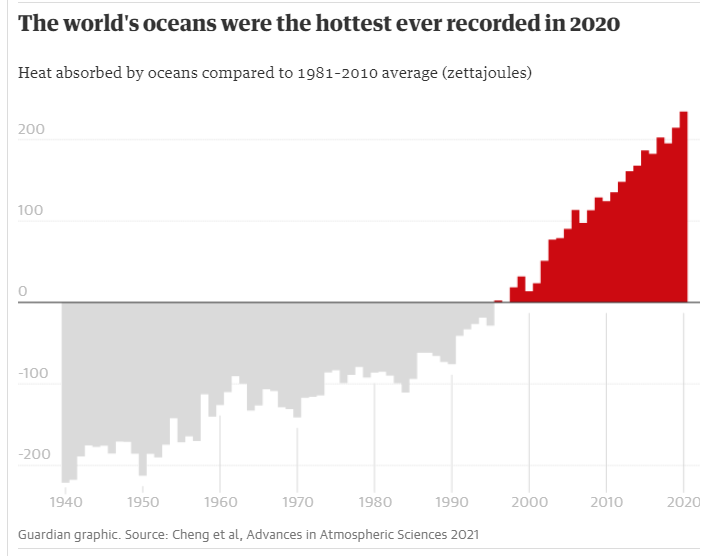Why are ocean warming records so important?

If we want to understand global heating, we have to examine ocean temperature trends.
As if 2020 could get any worse, the latest research showed that oceans hit their highest recorded temperatures, a record that keeps getting broken year after year.
Why are the oceans so important? It is quite simple: almost all of the extra heat we gain because of greenhouse gases ultimately ends up in the oceans. In fact, the oceans absorb more than 90% of the excess heat. Consequently, if you want to understand global warming, you have to measure ocean warming.
I am part of a team of 20 climate scientists who just published new research in Advances in Atmospheric Sciences. We collected temperature measurements spread out across the world’s oceans – measurements that in some cases, went back to the 1950s and even earlier. These data paint an unambiguous picture of a warming planet – warming that is a direct consequence of human emission of greenhouse gases.
Ocean warming has been continuing apace for as long as we have made measurements. Scientists acknowledge year-to-year records, but the long-terms trends are what matter most. Any single year that is warm or cold cannot prove or disprove global warming. The more important issue is, what happens year after year after year? Is there a trend?

The unambiguous answer is yes.
Since the oceans are huge, they absorb unbelievable amounts of energy. The most common everyday unit of energy is the joule. But for the oceans, we think about energy in terms of zettajoules. A zettajoule is equal to 1,000,000,000,000,000,000,000 joules. How much is this? Well, in the past year, according to our data, the Earth has absorbed about 20 zettajoules of heat, equivalent to the heat given off by 630bn common household hairdryers blowing all day and night, 360 days a year.
To check our findings, we compared our results with other institutions. We found that the US-based National Oceanic and Atmospheric Administration data also ranked 2020 as the hottest year ever for the oceans. Their data showed a much smaller warming last year compared with the preceding year, but over the long term, the data from the two groups agrees quite well. When different groups using different techniques reach similar conclusions, its adds confidence to the results.
“But people don’t live on the oceans, so why should we care?” That is a question I get all the time and the answer is clear. The oceans actually control the Earth’s weather. Approximately 70% of the planet is covered by ocean waters; when those waters heat, they in turn warm the atmosphere. Also, water evaporates from oceans into the atmosphere and the evaporation increases dramatically as temperatures rise.
Think about how humid a warm day can be compared to a cold day. By these mechanisms, oceans control both the temperature and the humidity level in the atmosphere. Consequently, oceans control the weather.
All of this affects humans. Warming oceans are creating more powerful storms, like cyclone Yasa, which recently hit the South Pacific. Some areas are becoming wetter, with heavier rainfall and flooding. Simultaneously, other areas are becoming more dry, with more intense heatwaves, droughts, and wildfires. We have seen these effects manifest with wildfires in Australia, the western US, and other locations.

We can expect studies like ours to become routine as global warming continues. We expect to see heat records continue to be broken and weather to become more and more strange. And of course, there will be costs – in human lives and infrastructure.
But there is still time to turn this ship around. We can still do things that make the future better for us and our children. With the change in leadership in the US, we can hope things will get better. President-elect Joe Biden must rejoin the rest of the world in working to create the planet we want and that our children deserve.
John Abraham is a professor of thermal sciences at the University of St Thomas in Minnesota
• The headline was amended on 14 January 2021 to more accurately reflect the content of the article.
13 January 2021
The Guardian







